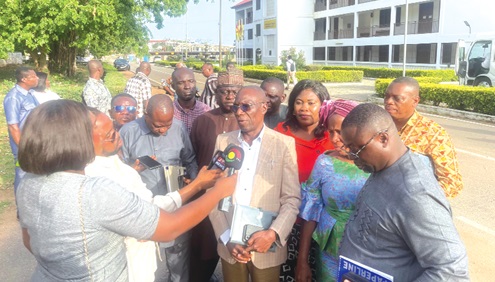The Parliamentary Select Committee on Education has expressed deep concern over the toll the double-track system is having on teachers and other staff of Senior High Schools (SHS) across the country.
It said the high number of students being managed under the double track system was overwhelming school administrators, as well as teaching and non-teaching staff.
“The double track system has taken a very large toll on school administrations.
Going round, we realise that the number of students the school authorities are managing is very high and if care is not taken, they will break down.
“From the heads of the various institutions down to the kitchen staff and labourers, none can take any leave breaks because as soon as one batch leaves, another arrives within three days,” the Chairman of the committee, Peter Kwasi Nortsu-Kotoe stated, saying that after the team had interacted with staff and heads of some schools, it came to light that they barely had time to rest.
He said the situation was having both physical and psychological effects, which called for an urgent phasing out of the double-track system.
Mr Nortsu-Kotoe, who is also the Member of Parliament for Akatsi North, led the committee to visit four SHSs in the Greater Accra Region last Monday.
The oversight visits by the committee are part of its mandate to monitor activities, policies and programmes of the Ministry of Education, particularly in SHSs and private universities.
Suggestion
Mr Nortsu-Kotoe suggested that students in the SHS should be redistributed more equitably among schools.
“We must also work towards reducing the numbers in Category A schools.
I don’t see why a school should have over 6,000 students managed by just 187 teachers.
It is not enough.
We need to expand facilities in Category B schools to accommodate more students from the next academic year,” he stressed.
Despite the difficulties, Mr Nortsu-Kotoe commended the heads of institutions and their staff for maintaining strong academic performance
The Greater Regional Director of Education, Hajia Katune Natogmah Attah, also acknowledged the growing strain the double-track system was placing on the country’s education sector, particularly in regions where staffing and infrastructure challenges persisted.
She urged the government to improve infrastructure to eliminate the need for the double-track system.
“We also want to appeal for an increase in educational infrastructure and facilities.
This will enable us to admit more students into our schools and eventually eliminate the need for the transitional system,” she added.
Hajia Attah also noted that some subjects continued to suffer due to the lack of qualified teachers, but expressed optimism that efforts were underway to close the gap.
“I’m pleased to share that measures have been put in place—such as assurance postings and teacher releases—to help address this issue,” she said.

